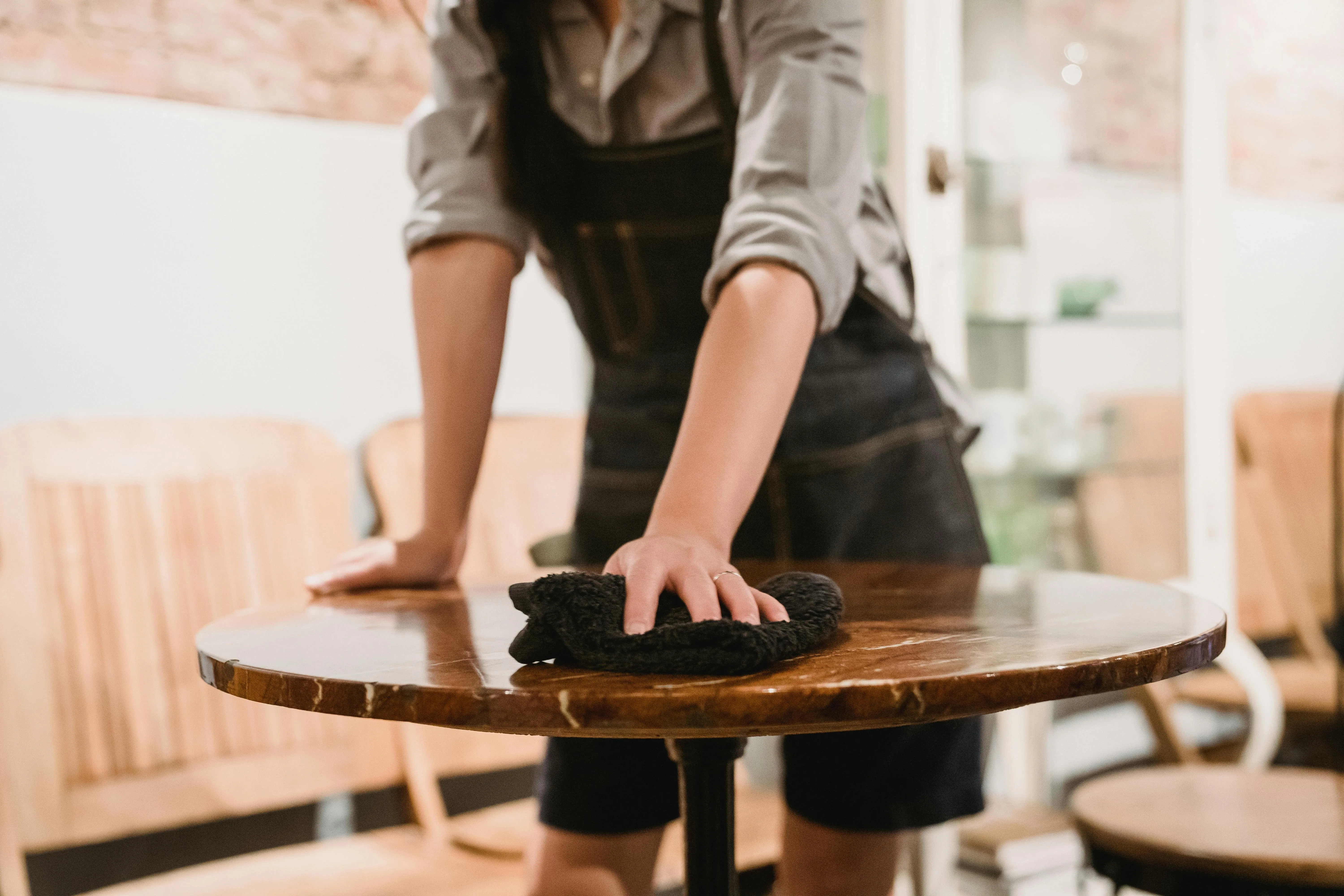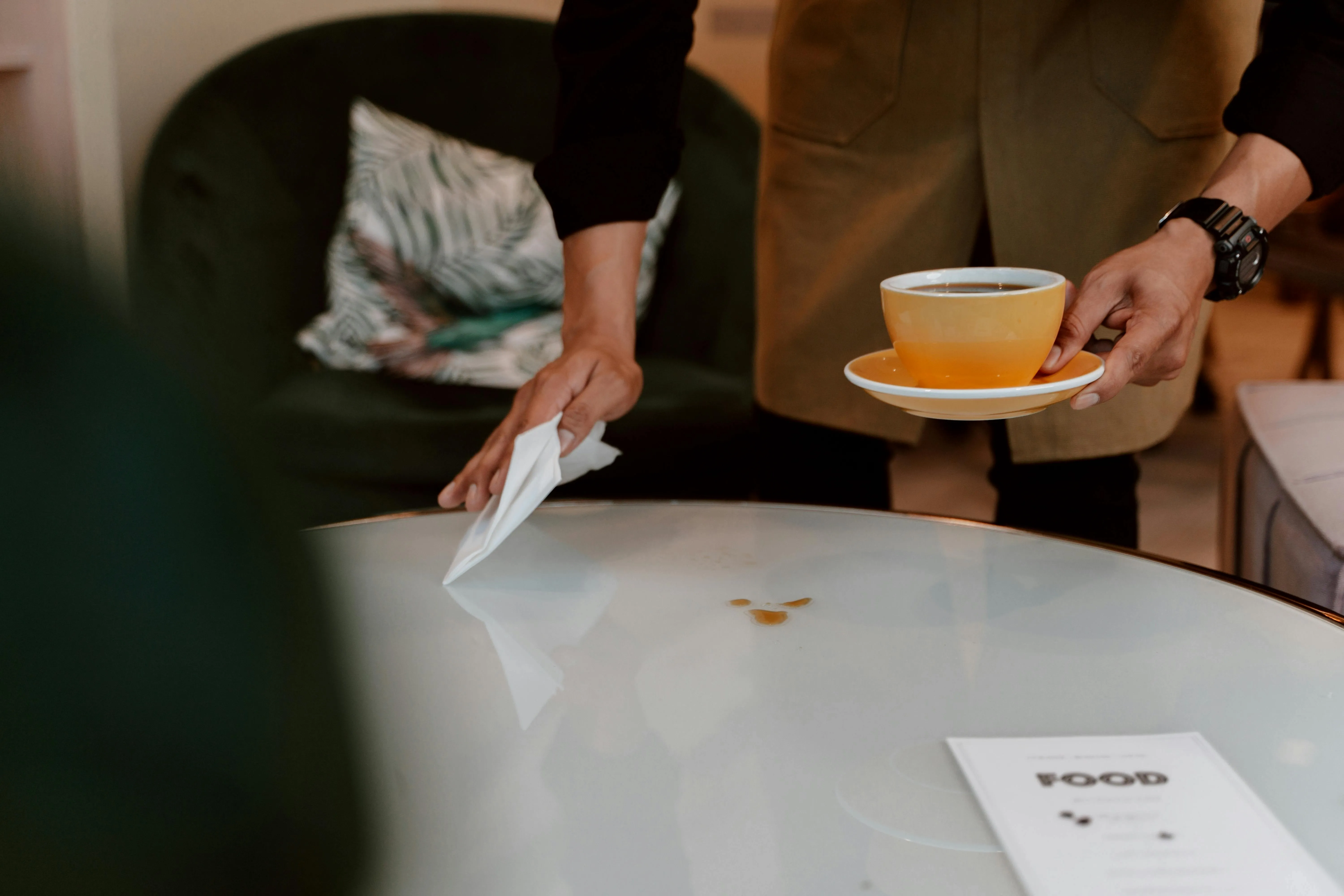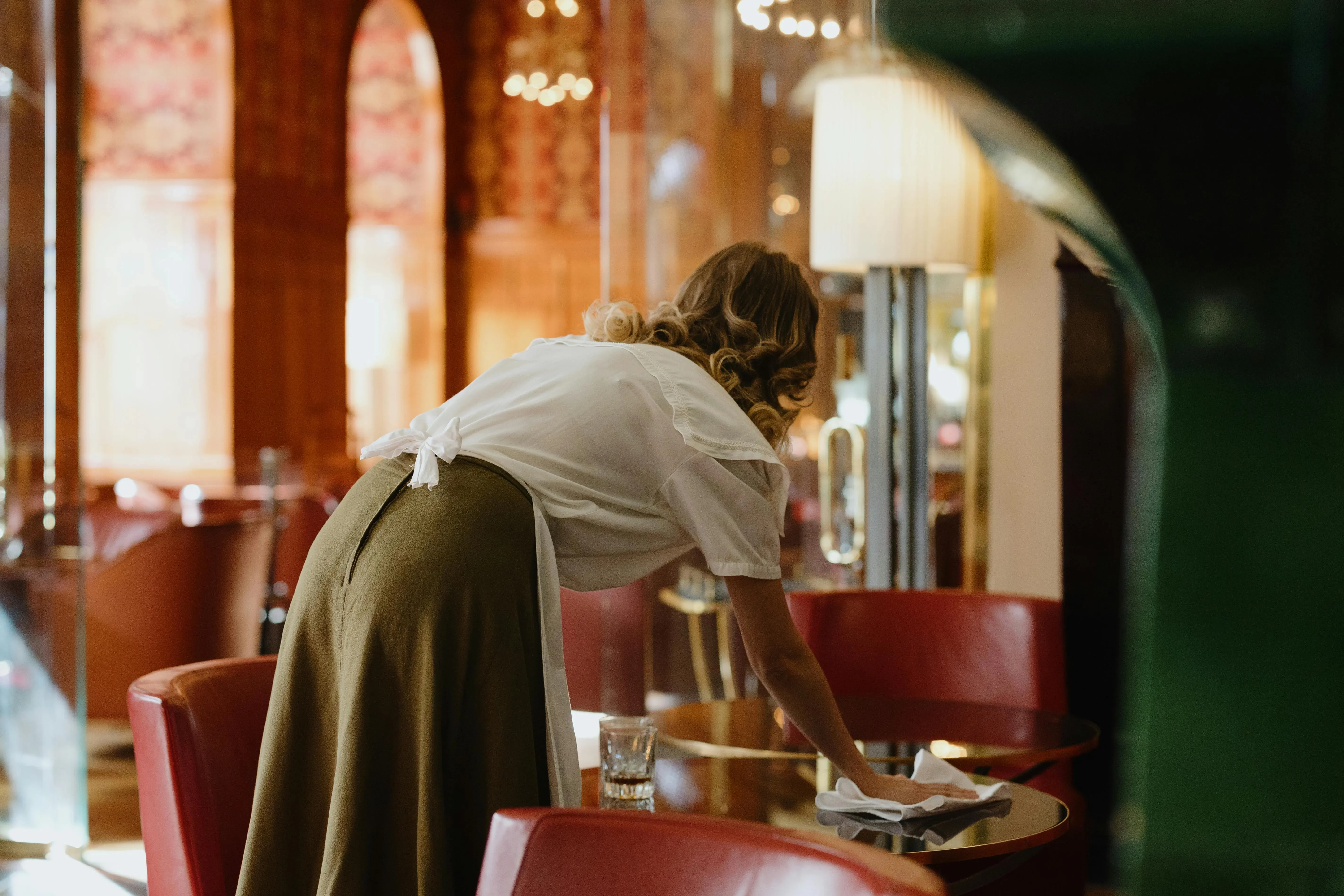How To Clean A Wood Table That Is Sticky: Effective Ways To Remove Stubborn Residue
Sticky residues can linger on wooden tables and become difficult to remove, often diminishing the natural beauty of the furniture. In this guide, we explore effective solutions for how to clean a sticky table, including techniques and products that eliminate stubborn stickiness without damage. Discover how you can restore your table’s finish with ease.

Key Takeaways
- Sticky residues on wooden tables are often the result of spilled drinks, food particles, or cleaning product buildup.
- ItÔÇÖs important to use mild cleaning solutions like dish soap and warm water, or white vinegar for tougher residues. These remove stickiness without causing damage.
- Dust and gently clean your table regularly to guard against sticky patches. Coasters and placemats are your friends, protecting against future spills.
- We supply high-quality custom coasters in a range of materials that offer effective tabletop protection and help improve your decor.
Table of contents
-
How To Clean A Wood Table That Is Sticky
-
Tips For Regular Maintenance After Cleaning A Sticky Wooden Table
-
How To Prevent Stickiness On Wooden Tables
-
How To Clean A Sticky Light And Dark Wood Table
-
How To Remove Sticky Residue From A Wood Table Top
-
How Do You Remove Sticky Grime From Wood?
-
How To Remove Sticky Tape Residue From Wood?
-
What's Making My Wooden Table Sticky?
-
Why Is My Table Sticky After Cleaning?
-
Does Vinegar Remove Sticky Residue?
How To Clean A Wood Table That Is Sticky
Cleaning a sticky wood table takes care and a meticulous approach to protect the surface as you tackle the residue. Sticky spots are often caused by things like:
- Spilled drinks
- Food particles
- Buildup from cleaning products
These residues can attract dust over time, creating a dirty patch. You will need to gather a few basic supplies, which we will look at in the next section, to restore your table’s appearance.
We will walk you through a step-by-step process to clean a sticky wood table without making the problem worse. We also recommend using our custom wood coasters to protect against future residues whilst complementing the aesthetic of your table.

Preparation And Materials Needed
Before you attempt to clean a sticky wooden table, you will need to gather the necessary cleaning supplies to make the process go smoothly. The materials you will need are:
- Soft cloths
- Mild dish soap
- Vinegar
- Warm water
These items are effective for tackling sticky residues but also gentle enough to clean without harming the wood’s finish.
We also recommend clearing the table of any other items and removing other loose debris from the surface with a soft, dry cloth. You will need to prepare yourself to patiently scrub the sticky patch in a way that won’t damage the table. This takes a little discipline and the correct approach, which we will outline in the next section.
Step-By-Step Cleaning Process
Here’s how to effectively clean a wood table that is sticky:
- Prepare a cleaning solution: Mix a small amount of mild dish soap with your warm water in a bowl. You want a slightly soapy solution that doesn’t have too many suds.
- Apply the solution: Dip a soft cloth into the cleaning solution and wring out excess liquid so that you don’t soak the wood. Apply your damp cloth to the sticky areas on the tabletop, gently scrubbing in circular motions to loosen the residue without any abrasiveness.
- Rinse away: Once you have cleaned the sticky spots, dampen another cloth with clean, warm water and wipe the table down to remove any remaining soap.
- Dry thoroughly: Deploy a soft, dry cloth to wipe the table again, ensuring it is completely dry to preserve the table’s wood finish without water damage.
Tips For Regular Maintenance After Cleaning A Sticky Wooden Table
To keep a wooden table free of sticky residues and protect its finish, the following tips should help:
- Regular dusting: Use a soft, dry cloth to dust the table at least once a week. This will help prevent the accumulation of debris and dirt that may lead to sticky buildups.
- Gentle cleaning: Use a mild solution of dish soap and warm water to clean the surface every 2-3 weeks. Don’t use any harsh chemicals.
- Protect the surface: Coasters, placemats, and trivets can help protect the table’s surface. It is important to use a coaster for hot drinks as well as cold ones.
- Spill management: Wipe up spills immediately to prevent stains and stickiness.
- Conditioning: Apply wood conditioner or polish periodically to maintain the table’s natural luster.
Add custom wood coasters to complement your wooden table
Design custom wood coasters with us to match the look of your wooden table and protect it against spills that leave sticky residue, simplifying your cleanup routines.
How To Prevent Stickiness On Wooden Tables
If you don’t want to have to get sticky residue off wood frequently, take protective measures to shield the surface from spills and heat. Here are some ways to do that:
- Tablecloths: Cover your table with a tablecloth when dining for a barrier against spills and stains. Washable materials are best for easy maintenance.
- Coasters and placemats: Coasters are used for preventing direct contact between drinkware and tabletops. This makes them effective at preventing spills and heat damage.
- Trivets: Place hot dishes on trivets or heat pads to protect against heat damage.
- Cleaning: Keep our table clean by wiping it frequently with a soft, damp cloth.
Our high-quality custom drink coasters are available in a huge range of materials so you get the protection you need. They can be personalized to match your aesthetic needs for a comprehensive tabletop solution.
How To Clean A Sticky Light And Dark Wood Table
To clean a sticky table, you must use an appropriate cleaning solution to prevent damage. Lightwood is more likely to show stains and discoloration, so you must use a mild cleaning solution that won’t get into the wood. You must also use gentle cleaning methods when tackling the stain, avoiding any chemicals or scrubbing that could be bad for the wood.
Dark wood is not as vulnerable to discoloration, but it can show streaks if you don’t rinse it properly. A similar mild solution is important, but rinsing is paramount to avoid leaving soapy residue. For both types of wood, the application of a wood conditioner or polish after cleaning will help preserve the wood’s natural appearance.

Cleaning Light Wood
To clean sticky residue off a light wood table, you must take extra care to prevent damage or discoloration. Avoid harsh chemicals as they can strip the wood’s finish. Here’s a step-by-step guide:
- Mix a mild cleaning solution using a few drops of dish soap in warm water.
- Dampen a soft cloth with the solution and gently wipe the sticky area with light pressure.
- Mix equal parts white vinegar and water to tackle more stubborn stains.
- After cleaning, rinse the area with a damp, clean cloth to remove any lingering residue.
- Dry the table thoroughly with a soft, dry cloth.
This should remove the sticky problem whilst protecting your table from damage effectively.
Cleaning Dark Wood
Here’s how to clean a dark wood table that is sticky:
- Mix a mild cleaning solution of warm water and dish soap. The solution should be mild to protect the wood’s finish.
- Dampen a soft cloth with your cleaning solution and gently scrub the affected area, following the wood grain.
- Don’t soak the wood, as it is hard to remove water stains from wood tables.
- Rinse the cloth and wipe the area again to remove soap residue.
After cleaning, it can be helpful to apply a high-quality wood conditioner or polish to restore the table’s natural luster. This will also help protect the surface. Buff the wood to a shine with a soft cloth.
Want to shield your wooden tabletops against sticky spills?
When you design custom absorbent coasters with us, you get an aesthetic tabletop accent that absorbs spills and reduces the need for cleaning sticky residues.
Start designing yoursHow To Remove Sticky Residue From A Wood Table Top
We have discussed the fact that you must protect the finish when cleaning a sticky wooden table. There are various common sticky residues, such as:
- Food spills
- Sticker adhesive
- Drink spills
You can safely test for residue by pressing a finger into suspected sticky areas or rubbing with a damp, soft cloth. If it feels sticky, you will need to apply a cleaning solution.
Think about the type of wood your tabletop is made from and determine the ideal cleaning method. Generally speaking, you should use gentle solutions with dish soap and avoid harsh chemicals that might harm the finish and discolor the wood. With the right care and attention, it is straightforward to restore the clean, pristine appearance of your wood table.
Effective Methods For Removing Sticky Residue From A Wooden Table Top
You may want to use natural remedies to clean a sticky table. The simplest solution is to use equal parts white vinegar and water - this creates a mixture that is gentle on wood but effectively breaks down common residues. Simply dampen a soft cloth with the solution and rub into the sticky area, following the grain of the wood. Make sure you don’t saturate the surface - excessive moisture can cause damage.
If you have a tougher residue that doesn’t respond to vinegar, you could try a small amount of mineral spirits. Apply them to a cloth and lightly rub the affected area. This method should be tested on an inconspicuous spot first to ensure it won’t harm the wood’s finish. When you have finished cleaning, wipe the table with a damp cloth and dry it thoroughly
How Do You Remove Sticky Grime From Wood?
Sticky grime on wood is usually a buildup of substances like dirt and oil that form a stubborn layer. This is a little different from a simple residue from a spill or sticky substance. Grime often occurs over time with repeated contact to food, drink, and dust. To remove it, try the following:
- Create a solution of mild dish soap and warm water.
- Dip a soft cloth into the soapy water and wring it out.
- Gently scrub the wood surface, following the grain to avoid scratching.
If the grime is too tough to remove this way, a commercial wood cleaner may be a good option. Choose one that is specifically designed to deep clean without damaging the finish. Always test the cleaner on an inconspicuous part of the table first, and dry the surface thoroughly after cleaning.
Add elegant bar coasters to your home or commercial bar
When you work with us, you can tailor the aesthetic of custom bar coasters to your decor or brand for a cohesive look that also shields wooden surfaces.
How To Remove Sticky Tape Residue From Wood?
You can effectively remove sticky tape residue from a wood table with the following steps:
- Soften the residue: Use a hair dryer to heat up the tape residue, softening the adhesive and thus making it easier to remove.
- Scrape away the residue: Use a plastic scraper or an old credit card to gently scrape off the softened residue. Take care not to scratch the wood surface; apply minimal pressure and work slowly.
- Clean the area: With a mixture of equal parts white vinegar and water, use a soft cloth to gently rub the solution into the remaining residue and remove it before drying the surface thoroughly.
This process should effectively clean your sticky wood table.
What's Making My Wooden Table Sticky?
There are several reasons a wood table might become sticky, including spills, food residue, and environmental factors:
- Spilled drinks: Beverages like soda and juice can leave behind sugary or oily films when they dry. The best coaster materials act as barriers against this.
- Food: Grease and food particles can accumulate on a surface over time, leading to stickiness.
- Environmental factors: Things like heat and humidity can affect a wooden table’s surface.
High humidity levels can make the wood’s finish soften or swell, causing dirt and dust particles to get trapped. Heat, mainly from sunlight exposure, can weaken the protective finish so it becomes more prone to a sticky buildup. You should clean regularly and make use of protective coverings to prevent these issues.
Need a personalized accent for your wooden tables?
Design custom print-on-demand coasters with us to get protective accessories that also enhance the aesthetic of your tables, with various materials and colors available to customize.
Create yours hereWhy Is My Table Sticky After Cleaning?
If your table feels sticky after cleaning, you may not have used an appropriate cleaning method or product. Failing to rinse the table thoroughly after using a cleaner can leave a residue, which will then dry and become sticky on the surface. Also, if you use too much cleaning solution, it can create a sticky film if not wiped away properly.
Certain cleaning products, particularly those with oils or waxes, can leave behind sticky residues. They may not be compatible with your table’s finish, leading to a gradual buildup over time. Avoid this by choosing a cleaner specifically designed for your table’s material, and rinsing with clean water before drying thoroughly.

Does Vinegar Remove Sticky Residue?
White vinegar can be used to effectively remove sticky residue as it is acidic, meaning it can break down adhesive bonds. If you use vinegar on wood, take care to avoid causing damage. Here’s a simple step-by-step guide on cleaning wood with vinegar:
- Mix equal parts white vinegar with warm water in a spray bottle.
- Test the solution on a small, inconspicuous area to ensure it doesn’t damage the finish.
- Apply the solution to the stick area by spraying on or using a soft cloth.
- Wipe the area gently then rinse away with a damp cloth.
Our custom personalized coasters are a great option to shield against spills and avoid sticky residues occurring on your tables, and they can contribute to your overall decor as well..
Frequently Asked Questions About How To Clean A Wood Table That Is Sticky
How Do You Clean A Sticky Wooden Table?
The best option is to use mild dish soap and warm water and rub the sticky area gently with a soft cloth. You should focus on lifting the residue without damaging the wood, so a cautious approach is important.
WhatÔÇÖs Making My Wooden Table Sticky?
In most cases, it will be a residue from a drink spill or food. It may also be a result of exposure to humidity or sunlight, or a consequence of an improper cleaning method.